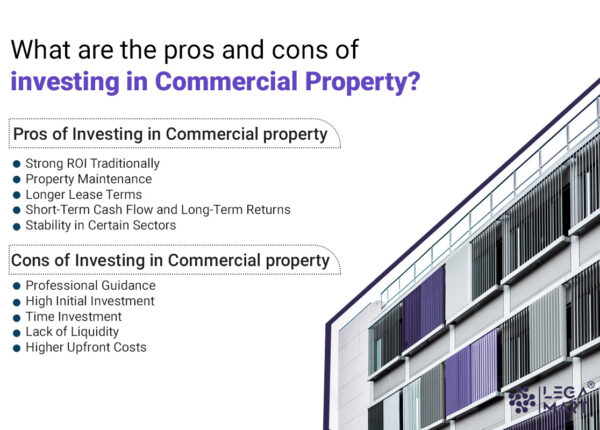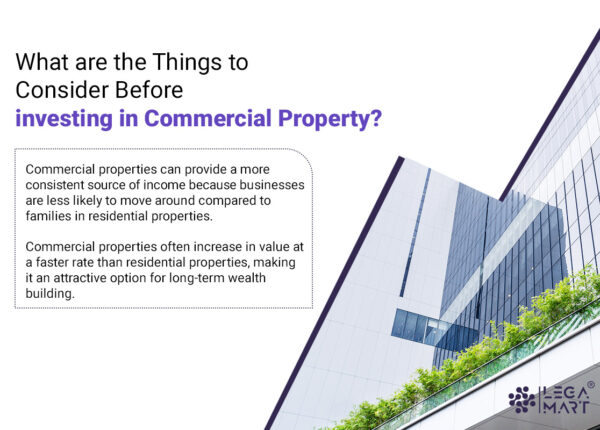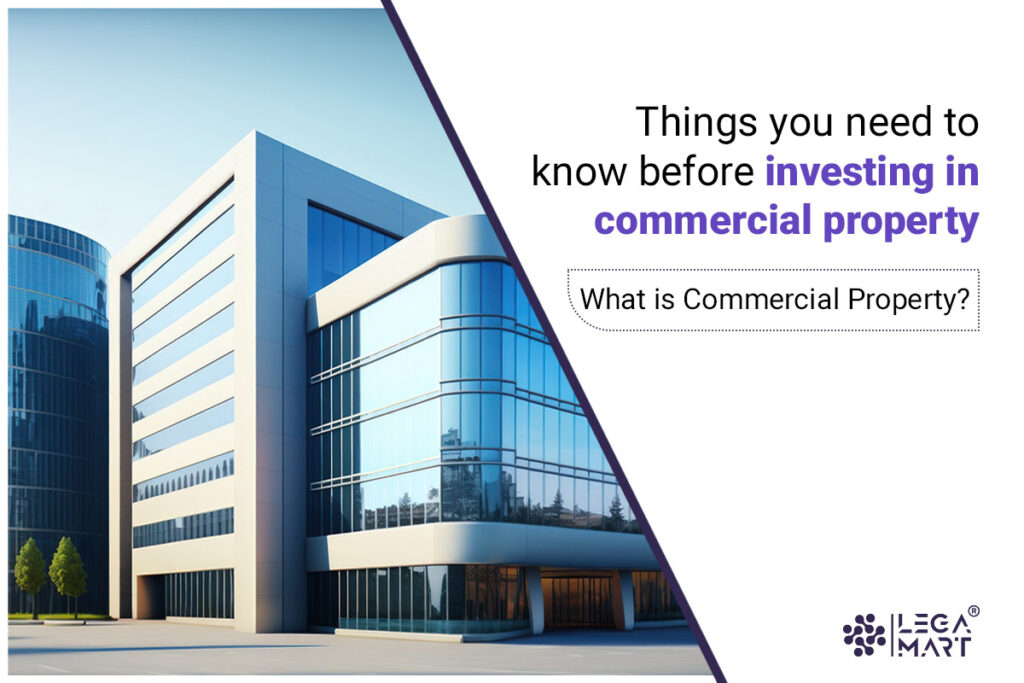Introduction
Investing in commercial property is an attractive prospect if you are seeking financial growth and diversification. This is a realm where office spaces, retail complexes, and industrial facilities become the building blocks of financial growth. However, this domain of real estate isn’t a one-size-fits-all endeavor, and it presents distinct challenges and opportunities.
Investing in commercial property can be a smart move for small business owners looking to secure their financial future. Whether you’re a seasoned entrepreneur or just starting out, owning a commercial property can offer stability and potential income growth. By understanding the nuances of the commercial real estate market, small business owners can make informed decisions that align with their long-term business goals. In this blog, we’ll explore essential factors to consider before taking the leap into commercial property investment, catering to the needs and aspirations of small business owners seeking to expand their ventures and build lasting wealth.
What is Commercial Property?
Commercial property refers to real estate used for business purposes. It is where various business activities happen, whether you plan to construct homes for sale or lease office spaces. This term typically covers buildings designed for business operations, but it can also encompass land used to generate profits and even large residential rental properties. Labeling a property as commercial has significant implications for how it’s financed, taxed, and governed by laws.
Commercial property comes in various forms, including malls, grocery stores, offices, industrial estates, manufacturing facilities, and more. The performance of commercial property, including factors like sales prices, rates of new construction, and occupancy rates, often serves as a barometer for business activity in a given region or economy.
What are the Pros and Cons of Investing in Commercial Property?

Investing in commercial property comes with its share of advantages and disadvantages, let’s explore the pros and cons to help you make informed decision on your investment plan in commercial property;
Pros of Investing in Commercial property
- Strong ROI Traditionally: Commercial property provides a strong return on investment, especially in high-demand, low-inventory areas, as such, the properties offer a higher return on investment (ROI) compared to residential real estate.
- Property Maintenance: Tenants in commercial properties tend to keep their premises well-maintained, reducing the need for frequent renovations and saving you money.
- Longer Lease Terms: Commercial properties offer longer lease terms than residential real estate, ensuring greater cash flow stability.
- Short-Term Cash Flow and Long-Term Returns: You can enjoy both short-term cash flow through leasing and long-term returns from capital gains over time.
- Stability in Certain Sectors: Commercial spaces like government and healthcare can offer stability during economic downturns.
Cons of Investing in Commercial properties
- Professional Guidance: You may need to hire specialists for sound decision-making, which can add to your investment costs. For example, it may demand complex legal knowledge, particularly, in commercial real estate laws, regulations, and best practices.
- High Initial Investment: Commercial property investments require substantial upfront capital, unlike residential real estate.
- Time Investment: Managing commercial properties demands more of your time for maintenance and safety measures compared to residential properties.
- Lack of Liquidity: Buying and selling commercial real estate is time-consuming, making it less liquid than other investment options.
- Higher Upfront Costs: Direct investing may require significant upfront investments, especially outside of partnerships or publicly traded REITs.
What are the Things to Consider Before Investing in Commercial Property?

When contemplating on investment in commercial property, there are essential factors to weigh before taking the plunge. Some of these considerations include: –
Firstly, it’s important to figure out your main goal: Are you investing to make a profit by increasing the property’s value over time, or are you looking for a steady income from it? Clearly defining your investment purpose is crucial because it helps you plan effectively.
Investing in commercial real estate can be a smart move for several reasons. For example:
- Commercial properties can provide a more consistent source of income because businesses are less likely to move around compared to families in residential properties.
- Commercial properties often increase in value at a faster rate than residential properties, making it an attractive option for long-term wealth building.
Types of Properties
Commercial properties are usually riskier compared to residential ones. In residential real estate, you can often gauge the future of a property by looking at similar properties, but in the commercial world, success hinges on the businesses operating within. The overall success of a commercial property can also be influenced by the economic conditions at the time. The most common types of commercial properties include retail spaces, office buildings, and industrial facilities.
Property Value
Get a professional estimate of the property’s value. This helps you understand how much money you’ll need to put into the property and whether the investment is financially sound. It’s also important to analyze historical price trends, the current demand in the market, and future projections to gauge the potential return on your investment.
Lease or Buy?
When it comes to commercial property, you have two primary options: purchasing or leasing. Here’s what each choice involves:
Buying
- If you buy a commercial property, you own it outright once you’ve paid off any loans.
- The advantages of ownership include the potential for property value appreciation, using the property’s equity as collateral for business financing, the ability to rent it out to tenants, tax benefits, and more control over space changes.
- However, buying requires a significant upfront payment, consideration of how to cover mortgage payments during vacancies, and your capital will be tied up in the property. You’re also responsible for structural repairs.
Leasing
- Leasing means renting the property from an owner for a short-term or long-term period. You might also have the option of a lease-to-own plan for future purchase.
- Leasing offers advantages like lower maintenance costs (structural maintenance is typically the owner’s responsibility), more accessible cash for other business needs, tax deductions on lease payments, and flexibility to relocate your business.
- On the downside, total rental payments may exceed what mortgage repayments would have been. You’re responsible for rent and service charges, even if the property becomes vacant for the full lease term. And you won’t benefit from long-term property value growth as you would with ownership.
Industry Trends
The world of commercial property investment is evolving rapidly. Staying informed about the latest trends in the industry is a smart move. The requirements and features that tenants and businesses are looking for can change, and your property should be adaptable to meet these evolving demands. Being aware of industry trends allows you to make adjustments to your investment strategy accordingly.
Property Characteristics
One of the advantages of investing in commercial real estate is the wide range of options available. In addition to different property types like retail, office, and industrial spaces, there are various characteristics to consider. These include property size, the quality of infrastructure, available amenities, layout, and the overall condition of the property.
Financing Your Investment
Commercial real estate comes with a hefty price tag compared to residential properties, this is because they are meant for businesses. So, be prepared to invest a substantial amount of money when you decide to make a purchase.
It’s crucial to carefully assess your cash flow and budget with a balanced and conservative approach. This helps you figure out the best deals that align with your goals and provides a clearer view of where to invest, the property’s size, and its type. Commercial investments are substantial, and your money will be tied up in a long-term plan. There are various ways to fund your investment:
- Direct Investment: This involves buying an entire property or a share in a property.
- Direct or ‘Bricks-and-Mortar’ Fund: These funds make commercial property accessible to smaller investors.
- Indirect Property Fund: In this case, you purchase shares in a company that owns a portfolio of commercial properties. This company can be involved in real estate, like a publicly traded homebuilder or a real estate investment trust (REIT).
REITs own and manage diverse commercial property portfolios, and their managers handle property acquisition, management, and sales. The income generated from rental yields is distributed to shareholders as dividends. Since you invest through the stock market, the value of property shares can fluctuate.
Location
When you’re thinking about investing in commercial real estate, the most crucial thing to consider is the location. Picking the right area can significantly affect how much your property’s value can grow and how much income you can generate. So, it’s vital to thoroughly research the location.
Furthermore, various other factors affect the demand for commercial spaces in that area. While properties in downtown business districts and top-tier cities are typically in high demand, many investors are now looking to suburban areas. Suburbs often offer more attractive deals and the potential for long-term success. This means they can be a smart choice for those seeking to invest in commercial real estate.
Conclusion
Commercial property offers a unique and dynamic investment opportunity, as such, it is not just property; it is a realm of opportunity. Its stark differences from residential property, including its purpose, pricing, tenants, and lease terms, make it an attractive option for those looking to diversify their portfolio and seek long-term income and growth potential. While it presents its own set of challenges and complexities, it rewards investors who navigate the commercial real estate landscape with careful planning, professional guidance, and a clear understanding of market dynamics. Whether you’re considering office spaces, retail properties, or industrial facilities, the world of commercial property opens doors to new avenues of financial success and prosperity
When navigating through commercial property investment, it’s crucial to consider not only what type of property suits your business needs but also the legal implications that come with it. To make right decisions and ensure a smooth journey, connecting with specialized lawyers from Legamart can be a valuable step. These legal experts can provide tailored guidance, helping small business owners decipher complex property laws ultimately safeguarding their investments and business interests.
Frequently Asked Question
Does commercial property differ from Residential Property?
Commercial real estate and residential property have some notable distinctions which can be broken down as follows:
- Purpose: Commercial real estate is primarily intended for business use, excluding residential rental properties like apartment buildings. It serves as workspaces designed to generate income for property owners and investors. In contrast, residential property is where people live.
- Complexity: Commercial properties transactions are frequently more intricate than residential ones. They often necessitate the collaboration of a team of professionals, including lawyers and accountants, to navigate the complexities involved in completing the transaction.
- Price: Commercial properties are generally larger structures located in high-traffic commercial areas. As a result, they tend to come with a significantly higher price tag compared to residential properties.
- Occupants: Residential properties are often occupied by their owners, who use them as their homes. In contrast, commercial properties are usually leased to business tenants who operate within the space.
- Lease Terms: Commercial real estate typically features longer lease terms compared to residential properties. On the other hand, residential apartments or houses are typically leased for shorter periods.
What are the different types of commercial real estate?
Commercial real estate comes in various categories, each serving different purposes and business models:
- Retail: This category involves renting property to businesses that retail and wholesale consumable goods, such as cereals, groceries, and shopping malls.
- Industrial: Investing in industrial commercial property often requires constructing large buildings that can house manufacturers and warehousing operations.
- Office Space: Commercial office spaces are designed for various small to large office rooms. They cater to businesses and professionals looking for workspace, offering flexibility in office size.
- Hospitality: This category includes businesses providing services like large hotels, restaurants, medical centers, and lodgings.
- Special Purpose: This includes properties like open land for fairs, amusement parks, churches, self-storage facilities, and bowling alleys, serving unique purposes outside the typical commercial real estate sectors.




